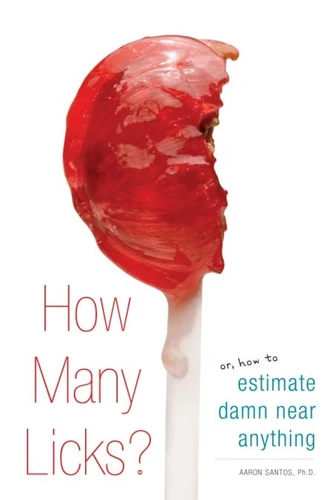How Many Licks?. Or, How to Estimate Damn Near Anything
Par :Formats :
Disponible dans votre compte client Decitre ou Furet du Nord dès validation de votre commande. Le format ePub protégé est :
- Compatible avec une lecture sur My Vivlio (smartphone, tablette, ordinateur)
- Compatible avec une lecture sur liseuses Vivlio
- Pour les liseuses autres que Vivlio, vous devez utiliser le logiciel Adobe Digital Edition. Non compatible avec la lecture sur les liseuses Kindle, Remarkable et Sony
- Non compatible avec un achat hors France métropolitaine
 , qui est-ce ?
, qui est-ce ?Notre partenaire de plateforme de lecture numérique où vous retrouverez l'ensemble de vos ebooks gratuitement
Pour en savoir plus sur nos ebooks, consultez notre aide en ligne ici
- Nombre de pages176
- FormatePub
- ISBN978-0-7624-3918-8
- EAN9780762439188
- Date de parution24/08/2009
- Protection num.Adobe DRM
- Infos supplémentairesepub
- ÉditeurRunning Press Adult
Résumé
How many licks to the center of a Tootsie Pop? How many people are having sex at this moment? How long would it take a monkey on a typewriter to produce the plays of Shakespeare? For all those questions that keep you up at night, here's the way to answer them. And the beauty of it is that it's all approximate! Using Enrico Fermi's theory of approximation, Santos brings the world of numbers into perspective.
For puzzle junkies and trivia fanatics, these 70 word puzzles will show the reader how to take a bit of information, add what they already know, and extrapolate an answer. Santos has done the impossible: make math and the multiple possibilities of numbers fun and informative. Can you really cry a river? Is it possible to dig your way out of jail with just a teaspoon and before your life sentence is up? Taking an academic subject and using it as the prism to view everyday off-the-wall questions as math problems to be solved is a natural step for the lovers of sudoku, cryptograms, word puzzles, and other thought-provoking games.
For puzzle junkies and trivia fanatics, these 70 word puzzles will show the reader how to take a bit of information, add what they already know, and extrapolate an answer. Santos has done the impossible: make math and the multiple possibilities of numbers fun and informative. Can you really cry a river? Is it possible to dig your way out of jail with just a teaspoon and before your life sentence is up? Taking an academic subject and using it as the prism to view everyday off-the-wall questions as math problems to be solved is a natural step for the lovers of sudoku, cryptograms, word puzzles, and other thought-provoking games.
How many licks to the center of a Tootsie Pop? How many people are having sex at this moment? How long would it take a monkey on a typewriter to produce the plays of Shakespeare? For all those questions that keep you up at night, here's the way to answer them. And the beauty of it is that it's all approximate! Using Enrico Fermi's theory of approximation, Santos brings the world of numbers into perspective.
For puzzle junkies and trivia fanatics, these 70 word puzzles will show the reader how to take a bit of information, add what they already know, and extrapolate an answer. Santos has done the impossible: make math and the multiple possibilities of numbers fun and informative. Can you really cry a river? Is it possible to dig your way out of jail with just a teaspoon and before your life sentence is up? Taking an academic subject and using it as the prism to view everyday off-the-wall questions as math problems to be solved is a natural step for the lovers of sudoku, cryptograms, word puzzles, and other thought-provoking games.
For puzzle junkies and trivia fanatics, these 70 word puzzles will show the reader how to take a bit of information, add what they already know, and extrapolate an answer. Santos has done the impossible: make math and the multiple possibilities of numbers fun and informative. Can you really cry a river? Is it possible to dig your way out of jail with just a teaspoon and before your life sentence is up? Taking an academic subject and using it as the prism to view everyday off-the-wall questions as math problems to be solved is a natural step for the lovers of sudoku, cryptograms, word puzzles, and other thought-provoking games.



